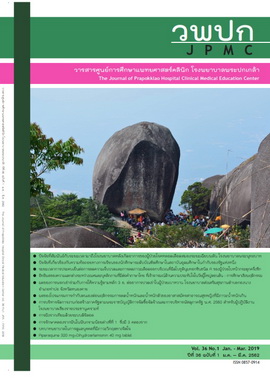Factors Related to Academic Burnout among Graduate Students in One Government University
Main Article Content
Abstract
Background: During graduate studies, students must attempt to meet many academic demands. If students cannot handle these conditions effectively, it can lead to academic burnout.
Objective: 1. To study the levels of self-efficacy and academic burnout among post-graduate students; 2. To explore the relationship between personal information, self-efficacy, and academic burnout; 3. To investigate how personal information and self-efficacy can aid in predicting academic burnout.
Materials and methods: Data was collected from 132 students in the Master’s Program of the Faculty of Medicine Siriraj Hospital, Mahidol University, using a questionnaire concerning personal information, self-efficacy, and academic burnout.
Results: The results revealed that self-efficacy scores among post-graduate students were at a moderate to high level. Also, academic burnout was at a low level. Self-efficacy and years of study were related to academic burnout. Personal information and self-efficacy predicted the capacity for academic burnout at 24 % with statistical significance at 0.05. However, only years of study in personal information was significant at 0.05 level, while self-efficacy was significant at 0.01 level.
Conclusion: From the results, students with more years of study were at greater risk to experience academic burnout, so activities to promote self-efficacy should be organized and geared toward those students in order to reduce the problem.
Article Details
References
Schaufeli WB, Martinez IM, Pinto AM, Salanova M, Bakker AB. Burnout and engagement in university students: a cross-national study. Journal of Cross-Cultural Psychology 2002; 33: 464-81.
Walburg V. Burnout among high school students: a literature review. Children and youth services review 2014;42:28-33.
Fuangfupong K. Perception of self-efficacy, optimism and job engagement: A case study of employees of personal and health care [dissertation]. Bangkok: Thammasat University; 2011.
Rahmati Z. The study of academic burnout in students with high and low level of self-efficacy. Procedia-Social and Behavioral Sciences 2015; 171:49-55.
Champathong S. Relationship between self-efficacy, Quality of working life and job burnout of personnel at the hospital in an autonomous university [dissertation]. Bangkok: Thammasart University; 2011.
Teepprachai N. A study of some factors related to educational burnout of undergraduate students in public open university distance learning [dissertation]. Bangkok: srinakharinwirot University; 2004.
Pasunon P. Sample size determination from Krejcie and Morgan (1970) approach in quantitative research. The Journal Of Faculty Of Applied Arts, King Mongkut's University of Technology North Bangkok 2014; 7(2):112-25.
Phattharayuttawat S, Manusirivithaya V, Ngamthipwatthana T. The development of Thai psychological capital inventory: version 44 Items. J Med Assoc Thai 2018;101(S1):S80-4.
Suppadit T. Factors affecting the achievement of learning at the master's level of the National Institute of Development Administration academic year 2011 [dissertation]. Bangkok: National Institute of Development Administration; 2013.
Capri B, Ozkendir OM, Ozkurt B, Karakus F. General self-efficacy beliefs, life satisfaction and burnout of university students. Procedia-Social and Behavioral Sciences 2012; 47: 968-73.
Bandura A. Self-efficacy: the exercise of control. New York: Worth Publishers; 1997.

